语句中因果关系的转换
第04讲 文本信息的筛选、整合和概括(讲义)(解析版)

第04讲文本信息的筛选、整合和概括目录文本信息的筛选、整合和概括筛选,就是在阅读的过程中根据阅读目的取舍信息的思维活动,捕捉和选取有效的、符合阅读目的的重要的语句,体会有关语句的隐含信息,舍弃无关紧要的内容。
整合,就是将筛选出来的信息进行整理、综合、转换的过程。
“筛选并整合”:一是指能够辨别材料中信息的正误;二是指能够从文中筛选出符合题目要求的有关语句,进行简单表述。
筛选信息的前提是审清题目要求,筛选出的信息要与题目相关;而整合信息则要对筛选出的信息进行分类集中,重新组合,粗略概括。
概括:“归纳内容要点,概括中心意思”包含概括段落中心、归纳内容要点、概括全文中心三个循序渐进的过程。
其中,分析理解是基础,综合归纳是核心,概括表达是关键。
信息类阅读试题关于文本信息的筛选、整合和概括,可以在选择题中出现,也可以在主观试题中出现。
试题形式灵活多样,这种考点的试题,一般出现在选择题和简答试题中,这是考查学生概括信息的能力,要有对信息进行筛选和整合的能力。
概括信息筛选整合信息实战技法整合信息题型一概括内容所谓“重要概念”,就是指含义丰富深刻,能够蕴含文章主题思想,能够体现作者观点态度的概念,一般涉及以下三点:①根据上下文推断含义深刻的概念;②根据上下文把握重要概念的语境义;③根据作者的观点理解重要概念的隐含义。
新高考现代文阅读Ⅰ,往往考查对“重要概念”内涵、属性和外延的理解。
此类题的阅读材料多为科普文。
【教材实例】阅读统编版教材选择性必修下第13课《宇宙的边疆》,从宇宙、行星系、恒星、太阳系、地球这几个说明对象中任选一个感兴趣的进行分析,找出说明对象的本质特征,并给它下定义。
【关联高考】[解析]下定义时应注意其“类属”和“特征”。
首先应明确历史地理学是一个学科。
然后根据材料梳理出它的研究对象、研究方法、特征、时代等要素,将其组合成一句完整的话语。
回答本题时还应注意不能将其与“沿革地理”混淆。
[参考答案]①历史地理学是现代地理学的分支学科,②具有时空结合的特征,③以自然和人文地理现象的产生、形成及其演化的过程为研究对象,④探寻这些现象产生、形成及其演化背后的原因和规律。
语文高考中的因果关系题型
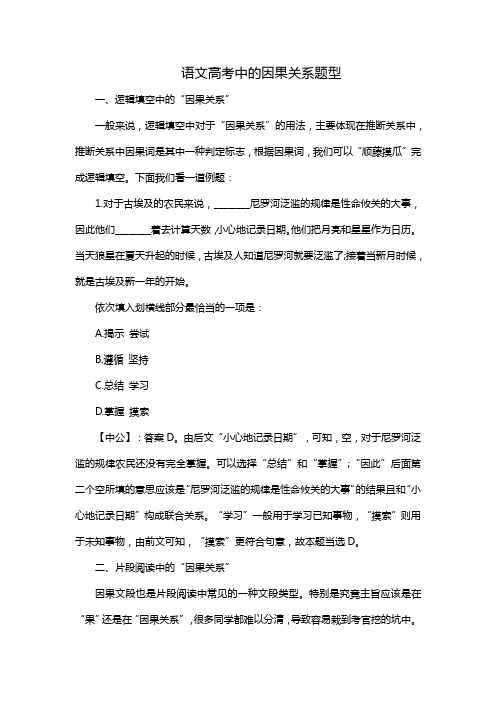
语文高考中的因果关系题型一、逻辑填空中的“因果关系”一般来说,逻辑填空中对于“因果关系”的用法,主要体现在推断关系中,推断关系中因果词是其中一种判定标志,根据因果词,我们可以“顺藤摸瓜”完成逻辑填空。
下面我们看一道例题:1.对于古埃及的农民来说,________尼罗河泛滥的规律是性命攸关的大事,因此他们________着去计算天数,小心地记录日期。
他们把月亮和星星作为日历。
当天狼星在夏天升起的时候,古埃及人知道尼罗河就要泛滥了;接着当新月时候,就是古埃及新一年的开始。
依次填入划横线部分最恰当的一项是:A.揭示尝试B.遵循坚持C.总结学习D.掌握摸索【中公】:答案D。
由后文“小心地记录日期”,可知,空,对于尼罗河泛滥的规律农民还没有完全掌握。
可以选择“总结”和“掌握”;“因此”后面第二个空所填的意思应该是“尼罗河泛滥的规律是性命攸关的大事”的结果且和“小心地记录日期”构成联合关系。
“学习”一般用于学习已知事物,“摸索”则用于未知事物,由前文可知,“摸索”更符合句意,故本题当选D。
二、片段阅读中的“因果关系”因果文段也是片段阅读中常见的一种文段类型。
特别是究竟主旨应该是在“果”还是在“因果关系”,很多同学都难以分清,导致容易栽到考官挖的坑中。
所以全面掌握因果关系,有利于考生拿到这部分的分数。
下面我们看两道例题:2.随着现代化的推进,传统文化与当代人的距离在拉大,恢复传统文化,绝不是简单地盖座仿古建筑,或穿上汉服、行几个跪拜之礼就足矣。
从历史角度来看,琴棋书画,诗香茶酒都是日常生活的重要内容,是生活美学、生命态度与生活方式构筑而成的有机整体。
因此,传统文化只有与现代生活相融合才能重新焕发,其复兴才有意义。
这段文字意在强调:A.传统文化与现代生活相融合的必要性B.传统文化与现代生活相融合的可能性C.传统文化与现代生活相融合的途径D.传统文化与现代生活相融合的前景【中公】:答案A。
句话说明传统文化与当代人距离大,要恢复传统文化,仅穿上汉服等方式是不够的;第二句话说明琴棋书画、诗香茶酒是日常生活以及生活美学等的重要内容和有机整体;最后一句话进行总结,得出结论,说明传统文化必须与现代生活相融合复兴才有意义,“只有……才……”,给出解决对策,强调的是必要性。
理解句子、段落之间的逻辑关系

前句提出条件或假设,后句说明结果或结论。
并列关系
前后句子意思并列或递进,没有主次之分。
05
理解段落间逻辑关系方法
明确段落主题和中心思想
识别主题句
段落的主题句通常位于段首或段尾, 通过阅读主题句可以快速了解段落的 主题。
概括中心思想
在阅读段落时,要注意概括每段的中 心思想,这有助于理解段落间的逻辑 关系。
示例
“他虽然很努力,但是没有成功。”中,“很努力”与“没有成功”形成转折关系。
并列关系
并列关系的定义
在文章中,层次、段落、语句、 词之间具有的一种相互关联、相 互并列的关系。并列关系可以是 相互关联的不同事物,也可以是 同一事物的不同方面,还可以是 同一主体的不同动作。
常见的并列关联词
和、跟、与、既…又…、不仅…而 且…等。
02
03
示例
“他没有好好学习,所以考试失败了 。”中,“没有好好学习”是“因” ,“考试失败”是“果”。
转折关系
转折关系的定义
前后两个分句的意思相反或相对,即后面分句不是顺着前面分句的意思说下去,而是突然转成同前面分句意思相反或 相对的说法,后面分句是说话人所要表达的正意。
常见的转折关联词
但是、然而、却、不过、尽管等。
重复关键词
在不同段落中重复出现关键词或 短语,有助于加强段落间的联系 和连贯性。
逻辑顺序
段落间的逻辑顺序应该清晰、合 理,如时间顺序、因果关系、总 分关系等。
段落间层次结构
01
总分结构
文章或段落可以采用总分结构, 先提出总的观点或主题,然后分 点进行阐述。
并列结构
02
03
递进结构
不同段落可以围绕同一主题或观 点进行并列阐述,共同支撑文章 的中心思想。
怎么把句子改为因果句式
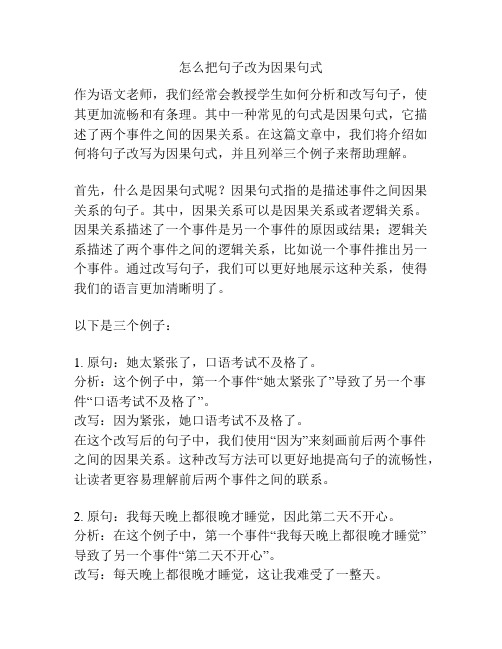
怎么把句子改为因果句式作为语文老师,我们经常会教授学生如何分析和改写句子,使其更加流畅和有条理。
其中一种常见的句式是因果句式,它描述了两个事件之间的因果关系。
在这篇文章中,我们将介绍如何将句子改写为因果句式,并且列举三个例子来帮助理解。
首先,什么是因果句式呢?因果句式指的是描述事件之间因果关系的句子。
其中,因果关系可以是因果关系或者逻辑关系。
因果关系描述了一个事件是另一个事件的原因或结果;逻辑关系描述了两个事件之间的逻辑关系,比如说一个事件推出另一个事件。
通过改写句子,我们可以更好地展示这种关系,使得我们的语言更加清晰明了。
以下是三个例子:1. 原句:她太紧张了,口语考试不及格了。
分析:这个例子中,第一个事件“她太紧张了”导致了另一个事件“口语考试不及格了”。
改写:因为紧张,她口语考试不及格了。
在这个改写后的句子中,我们使用“因为”来刻画前后两个事件之间的因果关系。
这种改写方法可以更好地提高句子的流畅性,让读者更容易理解前后两个事件之间的联系。
2. 原句:我每天晚上都很晚才睡觉,因此第二天不开心。
分析:在这个例子中,第一个事件“我每天晚上都很晚才睡觉”导致了另一个事件“第二天不开心”。
改写:每天晚上都很晚才睡觉,这让我难受了一整天。
在这个例子中,我们使用了“让……”这个结构来表达因果关系。
这种改写方式可以使句子更加简单直白,提高语言的可读性。
3. 原句:他很爱吃巧克力,所以今天他买了一整盒。
分析:第一个事件“他很爱吃巧克力”导致了第二个事件“今天他买了一整盒”。
改写:因为很爱吃巧克力,他今天买了一整盒。
在这个例子中,我们使用了“因为”这个词来表达因果关系。
这种改写方式可以使句子更加清晰明了,更加突出了因果关系,让读者更容易地理解句子的意思。
总结来说,将句子改写为因果句式是一种简单却有效的语言技巧。
通过增加前后事件之间的联系,我们可以提高语言的表达能力,使得写作更加流畅和易于理解。
为了搞清楚前后事件之间的关系,我们需要仔细地分析句子,并且注意前后事件之间的逻辑关系。
【步步高】(新课标)2016届高考语文大一轮总复习 语言文字运用 第二章 考点四 变换句式(含解析)
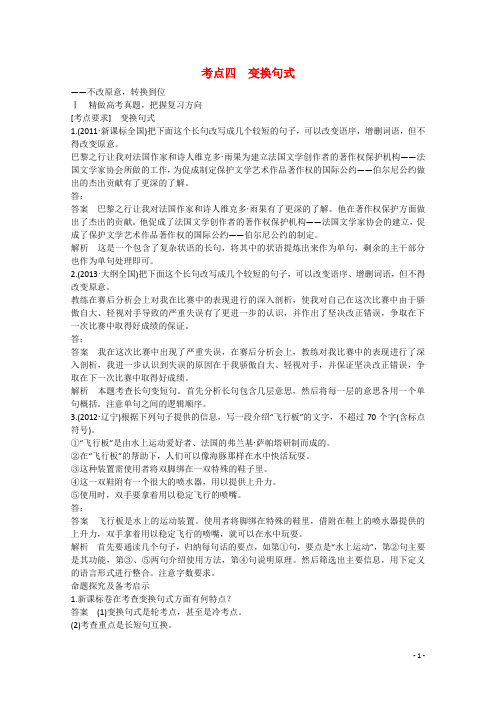
考点四变换句式——不改原意,转换到位Ⅰ精做高考真题,把握复习方向[考点要求]变换句式1.(2011·新课标全国)把下面这个长句改写成几个较短的句子,可以改变语序,增删词语,但不得改变原意。
巴黎之行让我对法国作家和诗人维克多·雨果为建立法国文学创作者的著作权保护机构——法国文学家协会所做的工作,为促成制定保护文学艺术作品著作权的国际公约——伯尔尼公约做出的杰出贡献有了更深的了解。
答:答案巴黎之行让我对法国作家和诗人维克多·雨果有了更深的了解。
他在著作权保护方面做出了杰出的贡献。
他促成了法国文学创作者的著作权保护机构——法国文学家协会的建立,促成了保护文学艺术作品著作权的国际公约——伯尔尼公约的制定。
解析这是一个包含了复杂状语的长句,将其中的状语提炼出来作为单句,剩余的主干部分也作为单句处理即可。
2.(2013·大纲全国)把下面这个长句改写成几个较短的句子,可以改变语序、增删词语,但不得改变原意。
教练在赛后分析会上对我在比赛中的表现进行的深入剖析,使我对自己在这次比赛中由于骄傲自大、轻视对手导致的严重失误有了更进一步的认识,并作出了坚决改正错误,争取在下一次比赛中取得好成绩的保证。
答:答案我在这次比赛中出现了严重失误,在赛后分析会上,教练对我比赛中的表现进行了深入剖析,我进一步认识到失误的原因在于我骄傲自大、轻视对手,并保证坚决改正错误,争取在下一次比赛中取得好成绩。
解析本题考查长句变短句。
首先分析长句包含几层意思,然后将每一层的意思各用一个单句概括。
注意单句之间的逻辑顺序。
3.(2012·辽宁)根据下列句子提供的信息,写一段介绍“飞行板”的文字,不超过70个字(含标点符号)。
①“飞行板”是由水上运动爱好者、法国的弗兰基·萨帕塔研制而成的。
②在“飞行板”的帮助下,人们可以像海豚那样在水中快活玩耍。
③这种装置需使用者将双脚绑在一双特殊的鞋子里。
怎么把句子改成因果关系的句子
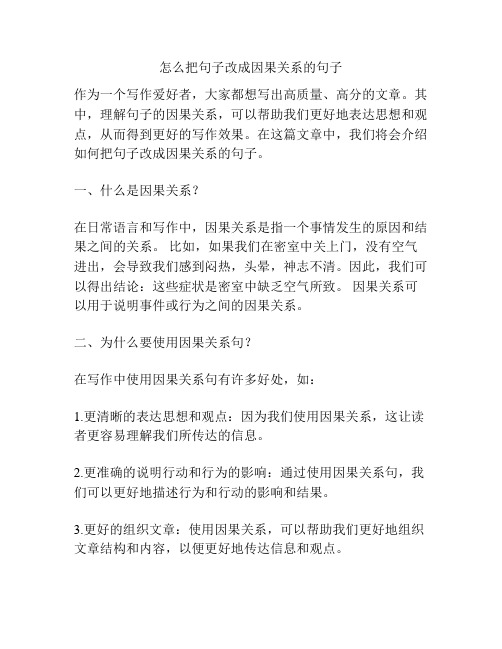
怎么把句子改成因果关系的句子作为一个写作爱好者,大家都想写出高质量、高分的文章。
其中,理解句子的因果关系,可以帮助我们更好地表达思想和观点,从而得到更好的写作效果。
在这篇文章中,我们将会介绍如何把句子改成因果关系的句子。
一、什么是因果关系?在日常语言和写作中,因果关系是指一个事情发生的原因和结果之间的关系。
比如,如果我们在密室中关上门,没有空气进出,会导致我们感到闷热,头晕,神志不清。
因此,我们可以得出结论:这些症状是密室中缺乏空气所致。
因果关系可以用于说明事件或行为之间的因果关系。
二、为什么要使用因果关系句?在写作中使用因果关系句有许多好处,如:1.更清晰的表达思想和观点:因为我们使用因果关系,这让读者更容易理解我们所传达的信息。
2.更准确的说明行动和行为的影响:通过使用因果关系句,我们可以更好地描述行为和行动的影响和结果。
3.更好的组织文章:使用因果关系,可以帮助我们更好地组织文章结构和内容,以便更好地传达信息和观点。
三、如何将句子改成因果关系的句子?以下是几种方法以及实践技巧,将句子转换成因果关系的句子。
1.使用关联词使用关联词(如因为、所以、由于等)可以帮助我们建立原因和结果之间的因果关系。
这样的句子更简单易懂,更容易让人们理解。
例1:原始句:我在早上起床后感到头晕。
改写后:由于我在早上起床后,感到头晕。
例2:原始句:我花了很多时间思考。
改写后:由于我花了很多时间思考,我得到了一个好的答案。
2.使用从句使用从句可以帮助我们表达原因和结果之间的因果关系。
和关联词一样,从句能够使句子逻辑更清晰明了,更容易理解。
例1:原始句:我不理解这个问题,因为我没有自信。
改写后:由于我没有自信,我不理解这个问题。
例2:原始句:我跑步后都会感到疲惫。
改写后:每当我跑步后,我都会感到疲惫。
3.使用引号和例子在文章中使用引号和具体的例子,可以帮助我们更好地表达因果关系。
例1:原始句:做运动,能够帮助提高健康。
改写后:做运动,“能够帮助提高健康”——这是国际媒体研究的结果。
第09讲 句式变换(讲义)(教师版) 2025年高考语文一轮复习讲练测(新教材新高考)
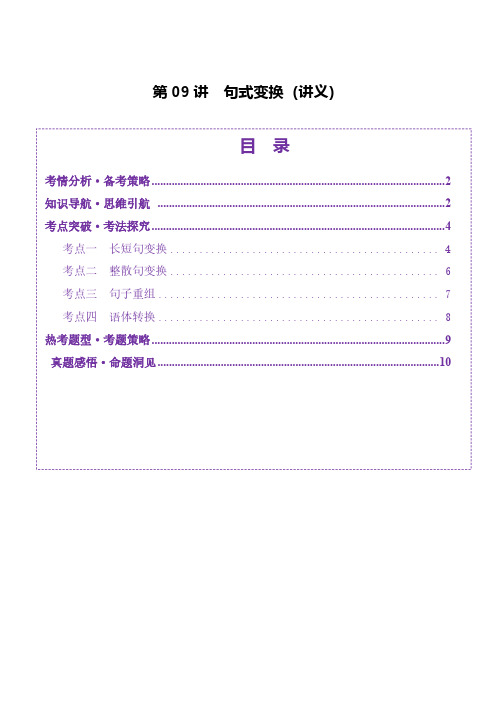
【答案】鲁迅和胡适革新中国的理想不同,鲁迅主张对现实社会作最彻底的抨击,而胡适则更多地关 注社会现实,因而两人最后分道扬镳。
【解析】原句为因果复句,先说结果,后说原因,重组时则要先说原因,后说结果,使全句形成“鲁 迅和胡适革新中国的理想不同……因而两人最后分道扬镳”的结构。
出来的”。
考点四 语体转换
语体转换主要将不同风格的语言进行互换。语体转换主要包括:口语与书面语转换、生动语与平实语 转换。语体之间的转换,关键在于准确而全面地甄选出需要转换语体的词句,按照题目要求,结合语体特 点,作出恰当而合理的转换。
1.口语与书面语
口语里经常出现而在书面语里较少出现的句式叫口语句式,书面语里经常出现而在口语里较少出现的
1.审清题目要求,明确做题的“方向”。 2.分析原句,把握句式特点、分句间关系、句子结构等,再根据重组的要求改变原句句式。 3.检验重组后的句子,看是否通畅,是否改变了原意,是否符合题目要求等。
1.请以“鲁迅和胡适革新中国的理想不同”开头,将下面的句子组合成一个语意通顺的单句。不超过 80 个字。(4 分)
第三步:整合答案。将上述提取后的成分进行整合,并依照事理或逻辑顺序,或充当定语,或充当 状语,与主干恰当组合,得出准确答案。
考点二 整散句变换
结构相同或相似的一组句子叫整句;相反,结构不整齐,各式各样的句子交错运用的一组句子叫散句。 整句主要有排比句、对偶句等,散句主要有长句短句交错、非排比句、非对偶句等。整句的特点是节奏鲜 明、音韵和谐、易于上口、语势强烈,散句的特点是富于变化、错落有致、形式灵活、使用面广。整散句 变换的基本方法是:
部编版小学语文六年级下册小升初按要求改写句子精选题-(含答案)

部编版小学语文六年级下册小升初按要求改写句子精选题-(含答案)小升初按要求改写句子精选题-小学语文六年级下册部编版1.句子广场。
(1)有一段时间,我们全迷上了斗竹节人。
(改成双重否定句)______ 。
(2)为了揭开火星神秘的面纱,科学家们决定利用宇宙飞船对火星作近距离的观察。
(修改病句)______ 。
(3)人们至今尚未在地球以外的太空中找到生命。
人们仍然相信遥远的太空存在着生命。
(用恰当的关联词连成一句话)______ 。
(4)例:下课时,教室里摆开场子,吸引了一圈黑脑袋,攒着观战,还跺脚拍手,咋咋呼呼,好不热闹。
常要等老师进来,才知道已经上课,便一哄作鸟兽散。
你在什么时候看到过别人入迷的样子?仿照例句,选择一个情景写下来。
______ 。
2.按要求改写句子。
(1)同茫茫宇宙相比,地球是渺小的。
这句话运用了________的说明方法。
用这种说明方法写一句话:______。
(2)院子里各个角落和暗洞你不是都很熟悉吗?(给句子换一种说法)______ 。
(3)我们必须认真克服并善于发现工作中的缺点。
(修改病句)______ 。
(4)班上要举行一次禁毒宣传,你是班里禁毒宣传员,请你设计一条禁毒口号向同学们宣传。
______ 。
3.按要求完成句子练习。
(1)仿照例句写一句话,借用表示神态或心理等的词语来代替“说”。
例:妈妈俯下身子盯着我的眼睛,一脸焦急:“你的眼睛怎么肿了?”______ 。
(2)修改病句。
我想,等革命胜利以后,一定要把这个闪烁着金色光芒的鱼钩送到革命烈士纪念馆去,让我们的子孙都来看望它。
______ 。
(3)用句子中的加点关联词语造句。
这不是粥,而是小型的农业产品展览会。
______ 。
4.按要求写句子①我国体育健儿顽强拼搏的事迹深深地激励着我们。
(缩写句子)______ 。
②这个富有创意的雕塑,作者是出自一位仅有初中文化水平的农民之手。
(修改病句)______ 。
③渔夫问桑娜:“我不在,你在家里做些什么呢?”(改为转述句)______ 。
定语从句体现因果关系-概述说明以及解释

定语从句体现因果关系-概述说明以及解释1.引言1.1 概述引言概述定语从句是英语语法中的一个重要概念,通过在主句中嵌入一个从句来修饰名词或代词。
定语从句的作用是为了进一步限定或修饰名词或代词的含义,从而使语句更加丰富和准确。
而其中一种常见的修饰方式就是体现因果关系。
在定语从句中,因果关系是一个常见的修饰方式,通过将原因和结果、条件和结论等因果关系的表达方式与名词或代词进行连接,进一步展示事物之间的因果联系。
通过使用定语从句体现因果关系,我们可以更加精准地描述事物之间的关联,使文笔更加丰富,表达更加准确。
在本文中,我们将探讨定语从句体现因果关系的方式以及其作用。
通过对该主题的深入研究,我们可以更好地理解定语从句的应用,并在写作中更加灵活地运用它,使文章更具有逻辑性和说服力。
在下一节中,我们将首先介绍定语从句的概念和特点,为进一步讨论因果关系打下基础。
1.2 文章结构2.正文2.1 定语从句的概念和特点:定语从句是一种用来修饰名词或代词的从句,它通常由关系代词(如that, which, who, whom, whose)或关系副词(如when, where, why)引导。
定语从句能够为主句提供额外的信息,进一步限定或说明所修饰名词或代词的意义。
在定语从句中,从句的意思对于所修饰名词或代词的理解起到了至关重要的作用。
同时,定语从句也具有以下几个特点:1. 定语从句通常紧跟在被修饰的名词或代词之后,形成一个整体的复合词组,从而与主句形成不可分割的关系。
2. 定语从句中的谓语动词通常由从句的引导词支配,因此它常常采用与主句谓语动词不同的时态和语态。
3. 定语从句可以修饰各种名词或代词,如人、物、地点、时间、原因等。
2.2 定语从句体现因果关系的方式:定语从句不仅能够在文章中起到修饰和补充信息的作用,还可以用来体现因果关系。
通过定语从句,我们可以表达一个事件或情况导致另一个事件或情况的结果或原因。
定语从句体现因果关系的方式主要有以下几种:1. 结果关系:通过使用引导词“that”或“so...that”引导的定语从句,来说明某个行动、事件或因素导致了某个结果。
2023届高考新题型训练:因果关系、病句修改、修辞手法、句式变换 课件41张
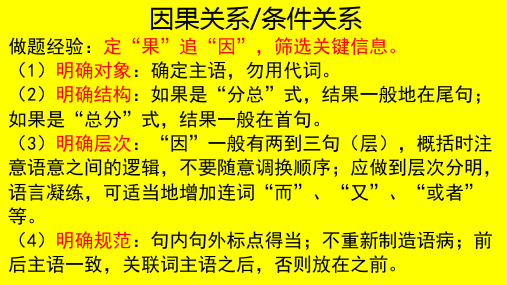
因为由在轨的天链卫星组成的通信网络能够为载人飞 船和空间站提供通信中继服务,所以“天地通话”得 以实现。
生命在于运动,运动需要科学。今天,全国各地健身热潮涌动,体育运 动逐渐成为一种日常生活方式。科学的运动健身可以促进人的身体健康, 有助于提高生命质量、减少医疗开支,是实现全民健康积极有效的手段。 一些非科学的运动健身方式,于增进健康并无益处,值得大家重视。
简述语段主要内容。要求使用包含条件关系的句子,表达简洁流畅,不超过 60个字。(4分)
病句修改
语序不当(注意并列短语、修饰语、关联词前后的分句) 搭配不当(注意动宾及介词搭配不当) 成分残缺(注意中心语何介词缺失) 成分赘余(有重复才删除,否则,不可随意删掉) 结构混乱(注意句式杂糅) 表意不明(注意数量短语) 不合逻辑(注意否定不当,两面对一面)
①考一虑多个项人维只度,有包根括据心自肺功己能的、身肌肉体力条量件、,柔韧②性选、择平衡适能宜力的等,运可动以形解 式效决 动 一和。运“负动处责强的 方 人度安 ” 。,全 ,性 在③、 兴进有趣行效爱科性好、的学可基的持础运续上性选动等择健问适身题 合,。 的所 运④以 动才每 方能个 式人 ,达都 做到需 自健要 身身个 健性 康的化 的功运 第
益。请用因果关系的句子,为上述材料写一个结论句。要求;表达简洁流
畅,不超过65个字。(4分)
要解决“天地通话”问题,就需要把地球上的“手机基站” 搬到更高的太空中去。从2008年开始,中国先后发射5颗天链卫 星,专门为载人飞船和空间站提供通信中继服务。天宫空间站无 论运行到地球上空任何地方,都可以由在轨的天链一号03星、04 星和天链二号01星组成的通信网络完美覆盖,像一个“太空基站” 一样将核心舱与地面站连接起来,建立起一条太空“天路”。
怎么把句子改成因果关系
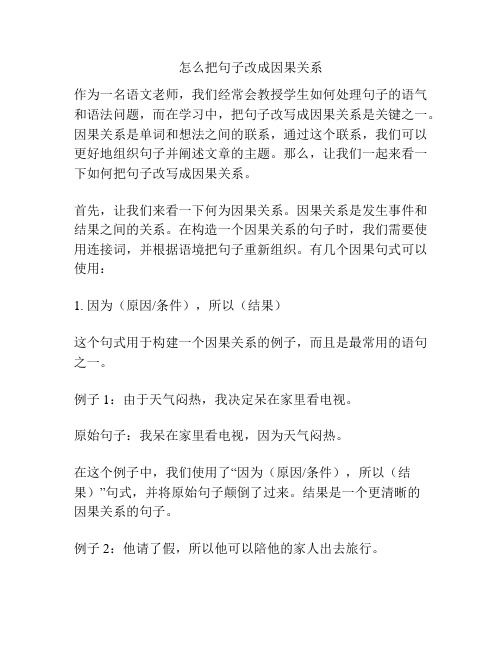
怎么把句子改成因果关系作为一名语文老师,我们经常会教授学生如何处理句子的语气和语法问题,而在学习中,把句子改写成因果关系是关键之一。
因果关系是单词和想法之间的联系,通过这个联系,我们可以更好地组织句子并阐述文章的主题。
那么,让我们一起来看一下如何把句子改写成因果关系。
首先,让我们来看一下何为因果关系。
因果关系是发生事件和结果之间的关系。
在构造一个因果关系的句子时,我们需要使用连接词,并根据语境把句子重新组织。
有几个因果句式可以使用:1. 因为(原因/条件),所以(结果)这个句式用于构建一个因果关系的例子,而且是最常用的语句之一。
例子1:由于天气闷热,我决定呆在家里看电视。
原始句子:我呆在家里看电视,因为天气闷热。
在这个例子中,我们使用了“因为(原因/条件),所以(结果)”句式,并将原始句子颠倒了过来。
结果是一个更清晰的因果关系的句子。
例子2:他请了假,所以他可以陪他的家人出去旅行。
原始句子:他可以陪他的家人出去旅游,因为他请了假。
这个例子同样使用了“因为(原因/条件),所以(结果)”句式,并颠倒原始句子。
2. A导致B这个句式用于描述一个事件或行为的结果。
它通常是指一个事件引起(或导致)另一个事件。
例子3:随着机器人技术的发展,许多工作岗位将会被替代。
原始句子:机器人技术的发展将导致许多工作岗位被替代。
在这个例子中,我们使用“A导致B”这个句式,把一个替换成了另一个。
这个句式还可以用于表达更深刻的因果关系。
例如:例子4:悲惨的童年经历导致了他的消沉情绪。
原始句子:他在童年时期遭受了非常悲惨的经历,导致了他的消沉情绪。
在这个例子中,我们使用“A导致B”这个句式,把句子改写成了一个更明显的因果关系。
3. 如果/由于……,则……这个句式用于描述一个特定情况下可能会发生的结果。
它通常与将来的情况相关。
例子5:如果你放弃学习,你将来会后悔。
原始句子:你将来会后悔,如果你放弃学习。
在这个例子中,我们使用“如果/由于……,则……”这个句式,通过改变句子的顺序,更清楚地描述了结果。
怎么把句子改成因果关系的方法
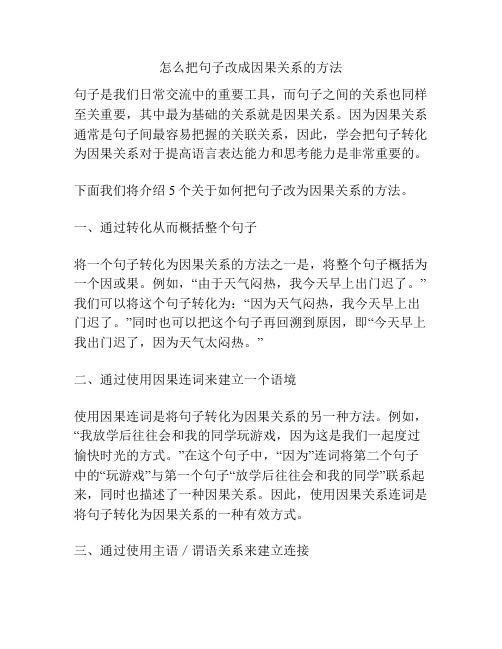
怎么把句子改成因果关系的方法句子是我们日常交流中的重要工具,而句子之间的关系也同样至关重要,其中最为基础的关系就是因果关系。
因为因果关系通常是句子间最容易把握的关联关系,因此,学会把句子转化为因果关系对于提高语言表达能力和思考能力是非常重要的。
下面我们将介绍5个关于如何把句子改为因果关系的方法。
一、通过转化从而概括整个句子将一个句子转化为因果关系的方法之一是,将整个句子概括为一个因或果。
例如,“由于天气闷热,我今天早上出门迟了。
”我们可以将这个句子转化为:“因为天气闷热,我今天早上出门迟了。
”同时也可以把这个句子再回溯到原因,即“今天早上我出门迟了,因为天气太闷热。
”二、通过使用因果连词来建立一个语境使用因果连词是将句子转化为因果关系的另一种方法。
例如,“我放学后往往会和我的同学玩游戏,因为这是我们一起度过愉快时光的方式。
”在这个句子中,“因为”连词将第二个句子中的“玩游戏”与第一个句子“放学后往往会和我的同学”联系起来,同时也描述了一种因果关系。
因此,使用因果关系连词是将句子转化为因果关系的一种有效方式。
三、通过使用主语/谓语关系来建立连接另一种方法是通过主语或谓语来建立句子之间的连接,从而描述出因果关系。
例如,“我的房间窗户没有关好,风把门吹开了。
”这个句子中,第二部分(风吹门开)是由第一部分(窗户没有关好)引起的。
我们可以使用“由于”或“因为”的口语化方式来将这个句子转化为:“因为我没把窗户关好,风吹开了门。
”四、通过使用从句建立句子间的联系有时候我们也可以使用从句来建立句子之间的因果关系,例如:“我太累了,因此决定不去上班。
”在这个句子中,“因此”连接主句和从句,因此形成了因果关系。
同理,我们也可以使用其他引导从句的从句连接词来建立因果关系。
五、通过倒装句来引发因果关系最后一个因果关系建立的方法是使用倒装句。
例如,“下雨了,我今天不去买菜了。
”我们可以将其转化为“下雨了,我今天不去买菜了。
语句中因果关系的转换
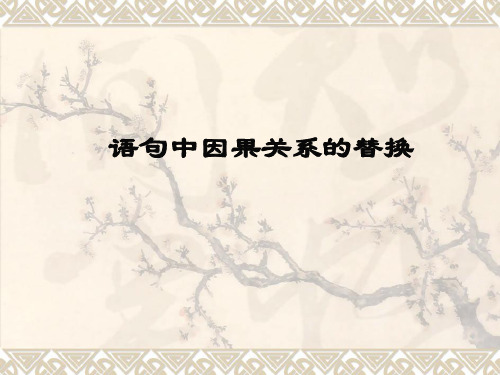
二.将英语的分词短语、独立结构、介词短语、不定式短 语译为汉语的复句。
分词短语:
Not knowing the language, he didn’t know how to ask the way. 他因为不懂语言,不知道怎样问路。
Being easily set on fire, alcohol must be kept away from the flame.
我们都因饥饿而极度虚弱,我们已经连续40个小时没吃东西了。
4、 for 表因为,由于,常有较活的译法。 France is famous for its wines.
法国因其酒而闻名。
I must apologize for call so late.
我很抱歉这么晚给你打电话。
5、 on 表示原因,可译为根据,由于,在。。。。。。下。 He made money on the deal.
3、from 表原因,译为由于,因 He wasn’t ill; he stayed in bed from laziness.
他没有病;他是由于懒惰而躺在床上的。
We were all weak from hunger, not having had food for over forty hours.
英语中某些定语从句从形式上看属于定语从句但从逻辑意义上分析他们却和主句构成了一层因果关系这类定语从句也常常译为汉语的因果复句
语句中因果关系的替换
英汉语言由于各自语言结构的差异,其表达 因果关系的方式也各有不同。 英语表达因果关系的方式:
介词,连接词、分词短语、独立结构、介词短语、形容词短语、不定式,状语从句。
由于吃得太多,他生病了。
It was all through you that we were late. 都是因为你的关系我们才迟到的。
大学英语四级考试段落翻译题型解析
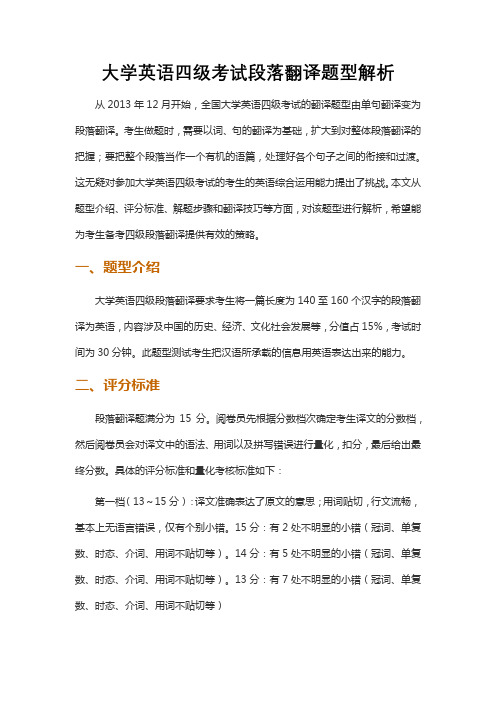
大学英语四级考试段落翻译题型解析从2013年12月开始,全国大学英语四级考试的翻译题型由单句翻译变为段落翻译。
考生做题时,需要以词、句的翻译为基础,扩大到对整体段落翻译的把握;要把整个段落当作一个有机的语篇,处理好各个句子之间的衔接和过渡。
这无疑对参加大学英语四级考试的考生的英语综合运用能力提出了挑战。
本文从题型介绍、评分标准、解题步骤和翻译技巧等方面,对该题型进行解析,希望能为考生备考四级段落翻译提供有效的策略。
一、题型介绍大学英语四级段落翻译要求考生将一篇长度为140至160个汉字的段落翻译为英语,内容涉及中国的历史、经济、文化社会发展等,分值占15%,考试时间为30分钟。
此题型测试考生把汉语所承载的信息用英语表达出来的能力。
二、评分标准段落翻译题满分为15分。
阅卷员先根据分数档次确定考生译文的分数档,然后阅卷员会对译文中的语法、用词以及拼写错误进行量化,扣分,最后给出最终分数。
具体的评分标准和量化考核标准如下:第一档(13~15分):译文准确表达了原文的意思;用词贴切,行文流畅,基本上无语言错误,仅有个别小错。
15分:有2处不明显的小错(冠词、单复数、时态、介词、用词不贴切等)。
14分:有5处不明显的小错(冠词、单复数、时态、介词、用词不贴切等)。
13分:有7处不明显的小错(冠词、单复数、时态、介词、用词不贴切等)第二档(10~12分):译文基本上表达了原文的意思;文字通顺、连贯,无重大语言错误。
12分:有一个严重错句11分:有3处明显语言错句。
10分:有4处明显语言错误。
第三档(7~9分):译文勉强表达了原文的意思;用词欠准确,语言错误相当多,其中有些是严重语言错误。
9分:5个句子正确或基本正确。
8分:4个句子正确或基本正确。
7分:3个句子正确或基本正确。
第四档(4~6分):译文仅表达了一小部分原文的意思;用词不准确,有相当多的严重语言错误。
6分:内容基本表达,有两个句子正确。
5分:一个句子正确。
新高考语文现代文阅读之信息类文本阅读题解答技巧
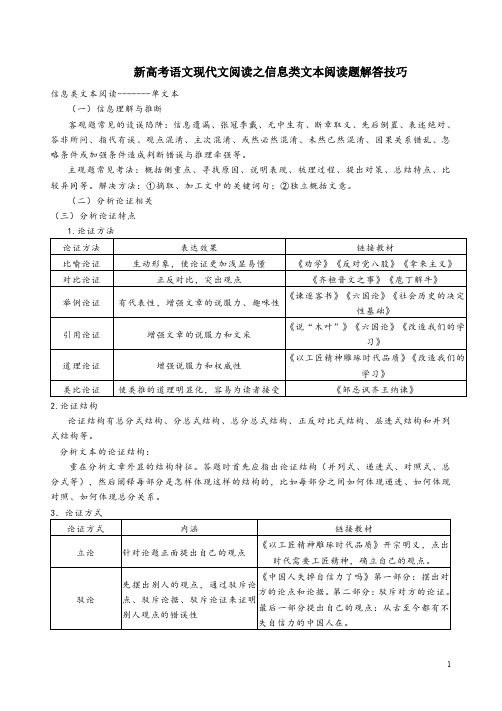
新高考语文现代文阅读之信息类文本阅读题解答技巧信息类文本阅读-------单文本(一)信息理解与推断客观题常见的设误陷阱:信息遗漏、张冠李戴、无中生有、断章取义、先后倒置、表述绝对、答非所问、指代有误、观点混淆、主次混淆、或然必然混淆、未然已然混淆、因果关系错乱、忽略条件或加强条件造成判断错误与推理牵强等。
主观题常见考法:概括侧重点、寻找原因、说明表现、梳理过程、提出对策、总结特点、比较异同等。
解决方法:①摘取、加工文中的关键词句;②独立概括文意。
(二)分析论证相关(三)分析论证特点1.论证方法论证方法表达效果链接教材比喻论证生动形象,使论证更加浅显易懂《劝学》《反对党八股》《拿来主义》对比论证正反对比,突出观点《齐桓晋文之事》《庖丁解牛》举例论证有代表性,增强文章的说服力、趣味性《谏逐客书》《六国论》《社会历史的决定性基础》引用论证增强文章的说服力和文采《说“木叶”》《六国论》《改造我们的学习》道理论证增强说服力和权威性《以工匠精神雕琢时代品质》《改造我们的学习》类比论证使类推的道理明显化,容易为读者接受《邹忌讽齐王纳谏》2.论证结构论证结构有总分式结构、分总式结构、总分总式结构、正反对比式结构、层进式结构和并列式结构等。
分析文本的论证结构:重在分析文章外显的结构特征。
答题时首先应指出论证结构(并列式、递进式、对照式、总分式等),然后阐释每部分是怎样体现这样的结构的,比如每部分之间如何体现递进、如何体现对照、如何体现总分关系。
3.论证方式论证方式内涵链接教材立论针对论题正面提出自己的观点《以工匠精神雕琢时代品质》开宗明义,点出时代需要工匠精神,确立自己的观点。
驳论先摆出别人的观点,通过驳斥论点、驳斥论据、驳斥论证来证明别人观点的错误性《中国人失掉自信力了吗》第一部分:摆出对方的论点和论据。
第二部分:驳斥对方的论证。
最后一部分提出自己的观点:从古至今都有不失自信力的中国人在。
立论驳论相结合针对论题先破后立或边破边立《拿来主义》:将不同现象进行归类,直接予以批驳,确立自己的观点。
改为因果关系的句子是什么意思
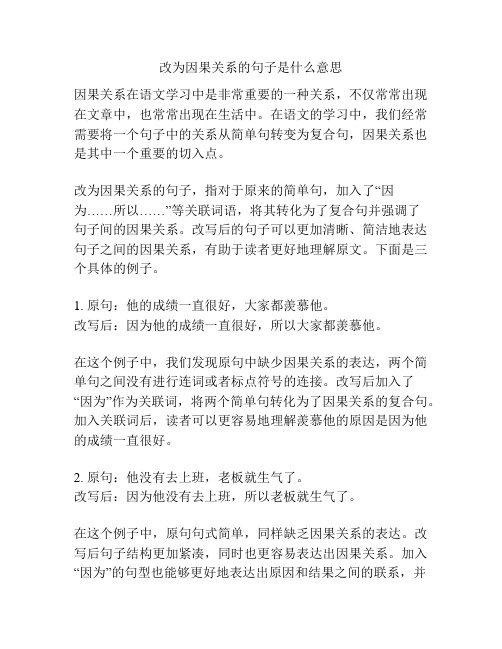
改为因果关系的句子是什么意思因果关系在语文学习中是非常重要的一种关系,不仅常常出现在文章中,也常常出现在生活中。
在语文的学习中,我们经常需要将一个句子中的关系从简单句转变为复合句,因果关系也是其中一个重要的切入点。
改为因果关系的句子,指对于原来的简单句,加入了“因为……所以……”等关联词语,将其转化为了复合句并强调了句子间的因果关系。
改写后的句子可以更加清晰、简洁地表达句子之间的因果关系,有助于读者更好地理解原文。
下面是三个具体的例子。
1. 原句:他的成绩一直很好,大家都羡慕他。
改写后:因为他的成绩一直很好,所以大家都羡慕他。
在这个例子中,我们发现原句中缺少因果关系的表达,两个简单句之间没有进行连词或者标点符号的连接。
改写后加入了“因为”作为关联词,将两个简单句转化为了因果关系的复合句。
加入关联词后,读者可以更容易地理解羡慕他的原因是因为他的成绩一直很好。
2. 原句:他没有去上班,老板就生气了。
改写后:因为他没有去上班,所以老板就生气了。
在这个例子中,原句句式简单,同样缺乏因果关系的表达。
改写后句子结构更加紧凑,同时也更容易表达出因果关系。
加入“因为”的句型也能够更好地表达出原因和结果之间的联系,并且更加适合写作文章,使文章的表达更加精确。
3. 原句:他一直有糖尿病,所以不能吃太多糖。
改写后:因为他一直有糖尿病,所以不能吃太多糖。
这个例子和前两个例子有些不同,原因是原句已经表达了因果关系。
但是改写后能够加强句子的权重和语气,以更加准确地表达原本的意思。
原句中表达的内容是该人有糖尿病,不能吃太多糖的结果,而改写后中表达的是他不能吃太多糖的原因是因为他有糖尿病,使得两句话之间的因果关系更加紧密。
总之,改写因果关系的句子可以让文章表达得更准确,更加简洁紧凑。
读者对文章的阅读理解也会更加直观,容易理解。
因果关系与生活息息相关,尤其在学习中需要格外注意,因为它可以帮助我们理清各种事物之间的联系,同时也可以使我们更加准确地表达自己的想法。
怎么把句子改为因果句式
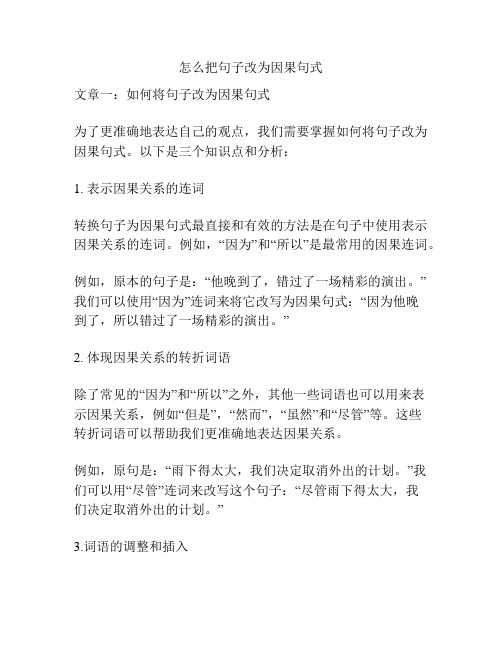
怎么把句子改为因果句式文章一:如何将句子改为因果句式为了更准确地表达自己的观点,我们需要掌握如何将句子改为因果句式。
以下是三个知识点和分析:1. 表示因果关系的连词转换句子为因果句式最直接和有效的方法是在句子中使用表示因果关系的连词。
例如,“因为”和“所以”是最常用的因果连词。
例如,原本的句子是:“他晚到了,错过了一场精彩的演出。
”我们可以使用“因为”连词来将它改写为因果句式:“因为他晚到了,所以错过了一场精彩的演出。
”2. 体现因果关系的转折词语除了常见的“因为”和“所以”之外,其他一些词语也可以用来表示因果关系,例如“但是”,“然而”,“虽然”和“尽管”等。
这些转折词语可以帮助我们更准确地表达因果关系。
例如,原句是:“雨下得太大,我们决定取消外出的计划。
”我们可以用“尽管”连词来改写这个句子:“尽管雨下得太大,我们决定取消外出的计划。
”3.词语的调整和插入有时候,将句子转化为因果句式需要对原句进行一些微小的修改和插入。
这就需要我们对词语的用法和语言使用的细节非常敏锐。
例如,原句是:“他无法帮忙,因此我们选择了别人。
”为了使这个句子成为因果句式,我们可以比较微调其结构,如下所示:“由于他无法帮忙,我们选择了其他人。
”总的来说,将句子转化为因果句式需要我们对语言的细节进行非常准确的掌握,并且通过不断地练习来提高技巧。
这三个知识点可以帮助我们更加有效地写作和表达我们的思想。
文章二:如何将句子变为因果句式--实用指南有几种方法可以将句子转换为因果句式,其中包括使用因果连词、转折词语和调整词语顺序。
以下是三个知识点和详细分析:1. 使用因果连词因果连词是将句子转化为因果句式的主要方法。
常用的因果连词包括“因为”、“所以”、“由此”等等。
例如,原句子为:“今天没有下雨,所以我们可以去野餐。
”我们可以通过使用“因为”来改写这个句子:“因为今天没有下雨,我们可以去野餐。
”2. 转折词语除了因果连词之外,转折词语也可以用来表达因果关系。
改成因果关系的句子是什么意思
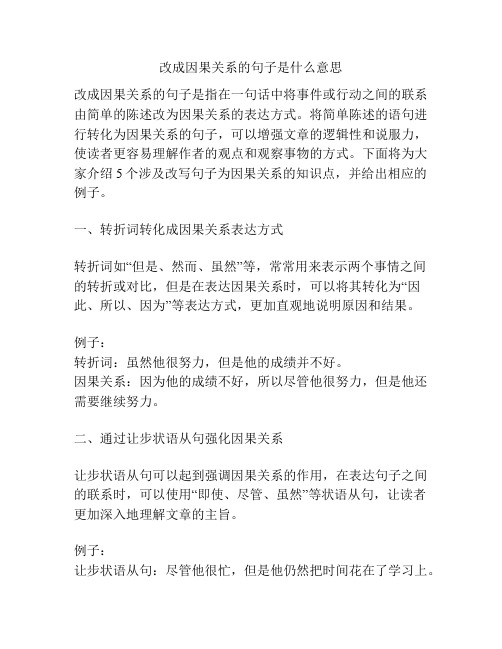
改成因果关系的句子是什么意思改成因果关系的句子是指在一句话中将事件或行动之间的联系由简单的陈述改为因果关系的表达方式。
将简单陈述的语句进行转化为因果关系的句子,可以增强文章的逻辑性和说服力,使读者更容易理解作者的观点和观察事物的方式。
下面将为大家介绍5个涉及改写句子为因果关系的知识点,并给出相应的例子。
一、转折词转化成因果关系表达方式转折词如“但是、然而、虽然”等,常常用来表示两个事情之间的转折或对比,但是在表达因果关系时,可以将其转化为“因此、所以、因为”等表达方式,更加直观地说明原因和结果。
例子:转折词:虽然他很努力,但是他的成绩并不好。
因果关系:因为他的成绩不好,所以尽管他很努力,但是他还需要继续努力。
二、通过让步状语从句强化因果关系让步状语从句可以起到强调因果关系的作用,在表达句子之间的联系时,可以使用“即使、尽管、虽然”等状语从句,让读者更加深入地理解文章的主旨。
例子:让步状语从句:尽管他很忙,但是他仍然把时间花在了学习上。
因果关系:他很忙,但是他仍然把时间花在学习上,因此在考试时取得了好成绩。
三、将并列句转化为连词并列句是由两个以上简单句组成的句子,在表达因果关系时,可以将其转化为连词的方式,更加清晰地表达句子之间的联系和逻辑关系。
例子:并列句:他既善于写作又擅长组织活动。
因果关系:他既善于写作,所以他经常被邀请为社团组织活动策划。
四、使用强调手段表达因果关系在句子中使用强调手段,比如强调句式、倒装句等,可以将事件或行动之间的因果关系更加明显地表达出来,措辞更有说服力。
例子:强调手段:仅仅两个月的时间,他已经取得了惊人的进步。
因果关系:两个月的时间内他的进步惊人,这是因为他每天埋头学习,付出的努力没有白费。
五、通过举例解释因果关系在表达因果关系时,举例子可以更加直观地解释和表达故事的内涵,让读者更加容易理解文章的主旨。
例子:举例:只有深入了解问题根源,我们才能找到解决问题的方法。
因果关系:在深入了解问题根源之后,我们才能找到解决问题的方法,就像医生需要了解病因之后才能够为患者开出正确的处方。
改成因果句子是什么意思
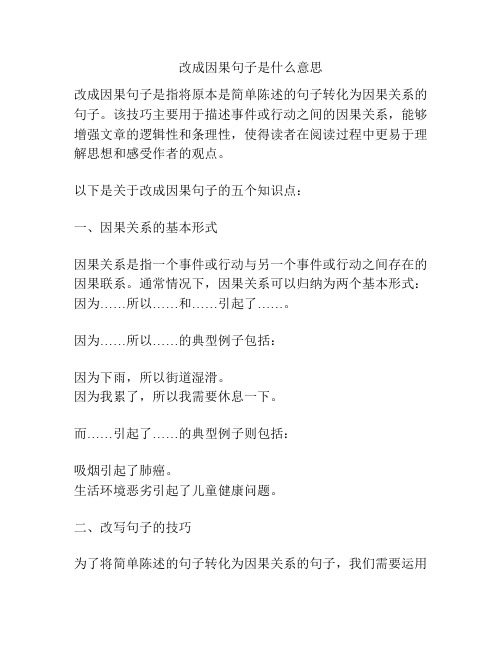
改成因果句子是什么意思改成因果句子是指将原本是简单陈述的句子转化为因果关系的句子。
该技巧主要用于描述事件或行动之间的因果关系,能够增强文章的逻辑性和条理性,使得读者在阅读过程中更易于理解思想和感受作者的观点。
以下是关于改成因果句子的五个知识点:一、因果关系的基本形式因果关系是指一个事件或行动与另一个事件或行动之间存在的因果联系。
通常情况下,因果关系可以归纳为两个基本形式:因为……所以……和……引起了……。
因为……所以……的典型例子包括:因为下雨,所以街道湿滑。
因为我累了,所以我需要休息一下。
而……引起了……的典型例子则包括:吸烟引起了肺癌。
生活环境恶劣引起了儿童健康问题。
二、改写句子的技巧为了将简单陈述的句子转化为因果关系的句子,我们需要运用一定的技巧。
具体来说,可以采用以下几种方法:1、使用因果连接词因果连接词能够将两个句子或从句联系起来,表明它们之间存在着因果关系。
一些常用的因果连接词包括:因为、所以、由于、导致等等。
例如:原句:我今天没去上班。
改写后:由于我感冒了,所以我今天没去上班。
2、使用动词和介词有些动词和介词也能够表达因果关系,例如造成、导致、使得、因为等等。
通过使用这些动词和介词,我们也可以将简单陈述的句子转化为因果关系的句子。
例如:原句:这个城市的空气质量很差。
改写后:工业污染造成了这个城市的空气质量很差。
3、使用定语从句定语从句能够对主句进行修饰和补充,增加句子的信息量和表达能力。
通过使用定语从句,我们可以将两个事件或行为之间联系起来,表达它们之间的因果关系。
例如:原句:他在工作中很卖力。
改写后:他在工作中很卖力,这让他升职加薪的机会增加了。
三、因果句子的使用场景因果关系的句子通常用于表达事件、行为、理论观点等之间的因果联系。
常见的使用场景包括:1、科学研究报告中,用于描述实验结果和结论之间的因果关系。
2、新闻报道中,用于分析事件发生的原因和影响。
3、学术论文中,用于阐述理论观点和实证研究的结果。
- 1、下载文档前请自行甄别文档内容的完整性,平台不提供额外的编辑、内容补充、找答案等附加服务。
- 2、"仅部分预览"的文档,不可在线预览部分如存在完整性等问题,可反馈申请退款(可完整预览的文档不适用该条件!)。
- 3、如文档侵犯您的权益,请联系客服反馈,我们会尽快为您处理(人工客服工作时间:9:00-18:30)。
We were proud of our motherland.
我们为祖国而感到骄傲。
You ought to be ashamed of yourself.
你应为自己感到羞耻。
7、 at 也可用来表示引起某种情绪的原因,常译为“为,对于”等 与某些形容词或分词连用。
He looked surprised at seeing us. 见到我们他看上去有些惊讶。 Peter was delighted at the chance. 彼得为这个机会而感到高兴。 They were overjoyed at his return to work. 他又回来工作了,他们为此而欢呼雀跃。
Since it’s getting dark, let’s stop and go home. 天黑了,我们停工回家吧。 天黑了,我们停工回家吧。
Because he is extremely selfish,Bob never cares for other people’s interests.
他因做这笔交易而赚了钱。
On their advice I applied for the job.
我听从他们的建议申请了这个工作。
6、of 与某些形容词或过去分词连用,表示引起某种情绪的原 因,常译为因为,由于。 He is scared of the dark.
他害怕黑暗。
I was tired of doing things of this kind.
我喜欢城市,但我更喜欢农村,因为在农村我有更多的朋友。
3、from 表原因,译为由于,因 He wasn’t ill; he stayed in bed from laziness.
他没有病;他是由于懒惰而躺在床上的。
We were all weak from hunger, not having had food for over forty hours.
独立结构
Steam still provides power, of which electricity is the obedient carrier, it being capable of transmitting power in any desired amount and to any place where it is necessary to use it. 蒸汽仍旧提供动力,而电则是动力的输送手段,因为电能够把任何数量的动 力输送到任何需要的地方去。 Her leg wounded, Ellen could do nothing but stay at home. 腿受伤了,艾伦只好呆在家里。
不定式:
We are overjoyed to see you.
见到你,我们很高兴。
介词短语
I felt guilty about leaving without saying goodbye. 我因不辞而别而感到内疚。
The accident resulted from Tom’s carelessness. 这事故由于汤姆不小心才造成的。
二.将英语的分词短语、独立结构、介词短语、不定式短 语译为汉语的复句。 分词短语: Not knowing the language, he didn’t know how to ask the way. 他因为不懂语言,不知道怎样问路。 Being easily set on fire, alcohol must be kept away from the flame. 酒精(因为)容易着火,必须放在与火隔绝的地方。 Asked to work overtime that evening, Jim missed the gettogether of old friends. 由于那天晚上被要求加班,吉姆错过了老朋友的聚会。
翻译方法之一: 将英语中表达因果关系的表达式,译为汉语的说明因 果式复句或推论因果式复句,同时增添适当地表示原 因的连接词,
翻译方法之二: 采用汉语意合的特点,将表原因的分句放在前 面,表结果的分句放在后面,省略连接词。
一、将英语中表某些的介词译为表原因的因 果复句
1、with 表示因为,由于,有种种译法。 Her eyes shone with pleasure.
语句中因果关系的替换
英汉语言由于各自语言结构的差异, 英汉语言由于各自语言结构的差异,其表达 因果关系的方式也各有不同。 因果关系的方式也各有不同。 英语表达因果关系的方式: 英语表达因果关系的方式:
介词,连接词、分词短语、独立结构、介词短语、形容词短语、不定式,状语从句。 介词,连接词、分词短语、独立结构、介词短语、形容词短语、不定式,状语从句。
2. 英语中某些定语从句从形式上看属于定语 从句,但从逻辑意义上分析, 从句,但从逻辑意义上分析,他们却和主句 构成了一层因果关系,这类定语从句也常常 构成了一层因果关系, 译为汉语的因果复句。 译为汉语的因果复句。
The little girl who was afraid of waking her father walked quietly out of the room. 因为担心吵醒父亲,小女孩悄悄地走出了房间。 I did not watch the movie, which I thought uninteresting. 我没看那部电影,因为我认为那部电影没意思。
她眼中闪烁着高兴的光芒。
She’s in the hospital with a desperate illness.
他因患重病住院了。
2. In 和 that 连用,表示原因是,因为,后接从句。 I like the city, but I like the country better in that I have more friends in the country.
汉语表达因果关系的方式:因果复句来实现。 汉语表达因果关系的方式:因果复句来实现。 汉语的因果复句:说明因果式和推论因果式。 汉语的因果复句:说明因果式和推论因果式。 说明因果式基本格式是“因为A,所以B A,所以 说明因果式基本格式是“因为A,所以B”, 前面的分句指出原因,后面分句说明结果; 前面的分句指出原因,后面分句说明结果; 推论因果式的基本格式是“既然A, A,就 推论因果式的基本格式是“既然A,就B”, 前面分句提出前提,后面分句推论出结果。 前面分句提出前提,后面分句推论出结果。
我们都因饥饿而极度虚弱,我们已经连续40个小时没吃东西了。
4、 for 表因为,由于,常有较活的译法。 France is famous for its wines.
法国因其酒而闻名。
I must apologize for call so late.
我很抱歉这么晚给你打电话。
5、 on 表示原因,可译为根据,由于,在。。。。。。下。 He made money on the deal.
at与某些动词连用,如
Sometimes she takes offence at trifles. 有时她会因一些小事儿发怒。 We all rejoiced at the news of your success. 我们都为你成功的消息而高兴。 at 用在某些名词或词组后面。 The whole house was in grief at his death. 屋里所有的人都为他去世而感到悲痛。 He was in high spirits at the prospect. 他为美好的前景感到精神振奋。
三、将英语的句子翻译为汉语的因果复句。
1.英语的原因状语从句可以根据汉语的习惯,直接译为汉语因果复句。将 表原因的分句置于句首。在现代汉语中,由于受西方语言的影响,有时也 将表原因的分句置于句末,此时,从句往往含有补充说明的作用。
Since the flight was cancelled , they had to stay there for one night. 因为航班被取消,他们只能在那儿住一晚。 Many people slipped down because the road was too slippery. 因为路太滑,很多人都滑到了。 As she has always been working hard, Miss Smith got promoted soon. 史密斯小姐一直工作努力,因此很快得到了提升。 We all like reading because we can learn a lot from it. 我们都很喜欢读书,因为能从中学到许多知识。 It must be morning now, for the birds are singing. 现在一定是天亮了,因为鸟儿在歌唱。 Since he insists on his viewpoint, we shall take up the matter at the next meeting. 既然他坚持自己的观点,我们要在下次会议讨论这件 事。
8、through 也可用来表示原因,译为由于,因为 的关系 He becam得太多,他生病了。
It was all through you that we were late. 都是因为你的关系我们才迟到的。
9、by置于不带the的名词前,表示原因,可译为由于 I did it by mistake. They met by chance. The coroner’s verdict was death by misadventure. 验尸官判定是意外致死。
鲍勃极端自私,他从不会关心别人的利益。 鲍勃极端自私,他从不会关心别人的利益。 In winter, very few visitors travel in the north because it is extremely cold. 冬天,北方的天气相当寒冷,游客非常少。 冬天,北方的天气相当寒冷,游客非常少。
